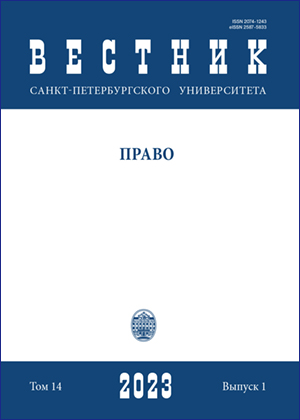Features of the constitutional and legal status of the governments of the member states of the Eurasian Economic Union
DOI:
https://doi.org/10.21638/spbu14.2023.114Abstract
The consideration of the peculiarities of the constitutional and legal statuses of the governments of the Eurasian Economic Union (EAEU) states (Russia, Belarus, Kazakhstan, Armenia and Kyrgyzstan), in the context of the economic integration in the Eurasian post-Soviet space that is increasingly deepening today, is of considerable practical interest. The authors note that the differences in the constitutional and legal statuses of the governments of the EAEU states are primarily due to the peculiarities of the forms of government enshrined in the constitutions of these states, which, for the most part, cannot be classified according to the traditionally distinguished sub-forms of the republican form of government. Despite the debatable nature of the structure of the constitutional and legal status of the government, the authors, taking into account the peculiarities of the forms of government enshrined in the EAEU states, focus on such elements as: constitutional and legal characteristics; composition, procedure for the formation and early termination of powers; competence. Summing up the overall results of the study, the authors come to the conclusion that, despite the presence of common views on economic integration, the EAEU states do not seek unification in terms of the organization of state power on their territory. However, despite this, the general trends towards the possible improvement of the constitutional and legal status of the governments of the majority of the EAEU states can still be identified. These include, first of all, a gradual increase in the degree of independence of governments from the head of state, which, in turn, can be achieved by strengthening the direct interaction of the government with the parliament, as well as by taking into account the opinion of the parliament or its lower house when forming or early termination of the government’s powers.
Keywords:
government, executive branch, form of government, head of state, constitutional and legal status
Downloads
References
Downloads
Published
How to Cite
Issue
Section
License
Articles of "Vestnik of Saint Petersburg University. Law" are open access distributed under the terms of the License Agreement with Saint Petersburg State University, which permits to the authors unrestricted distribution and self-archiving free of charge.






